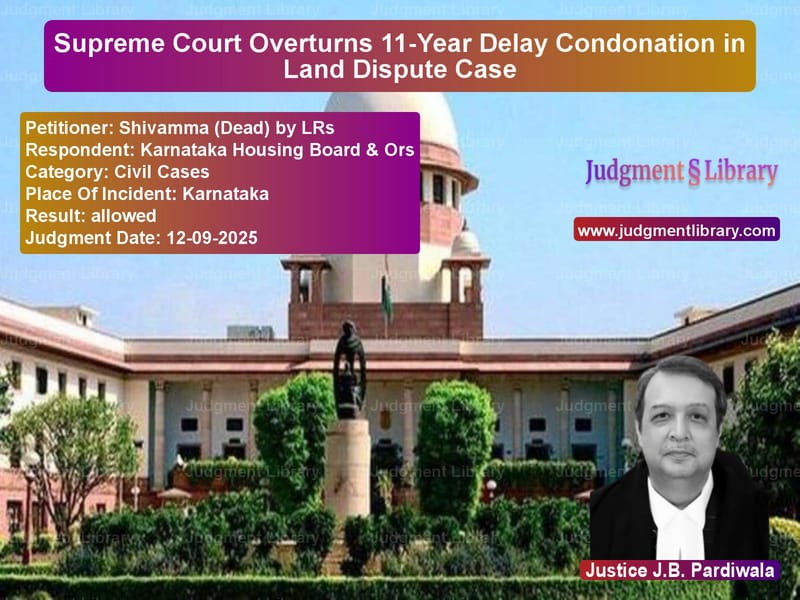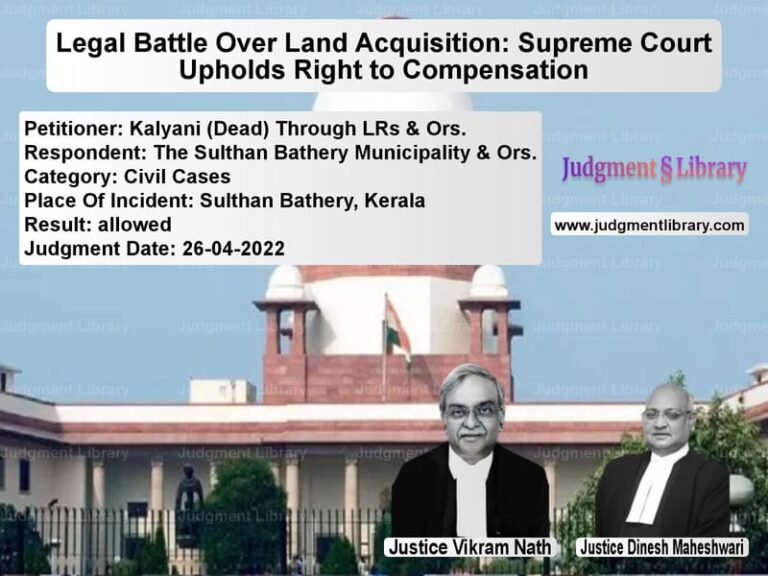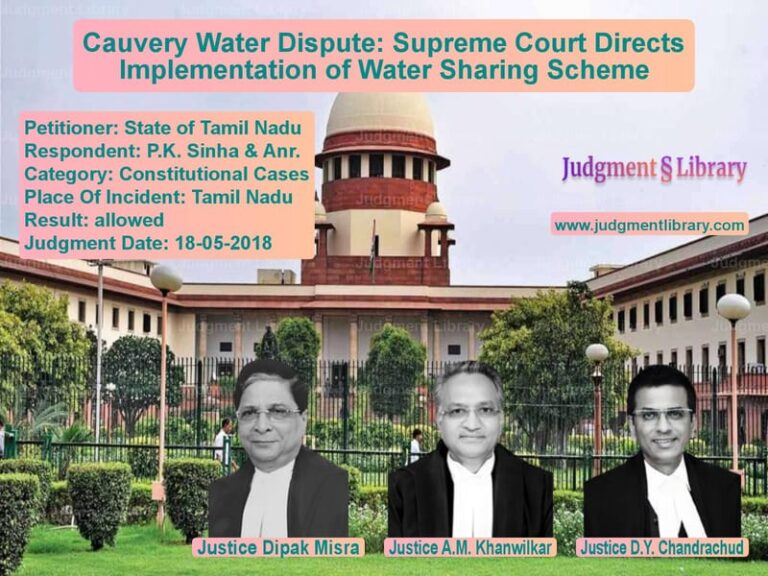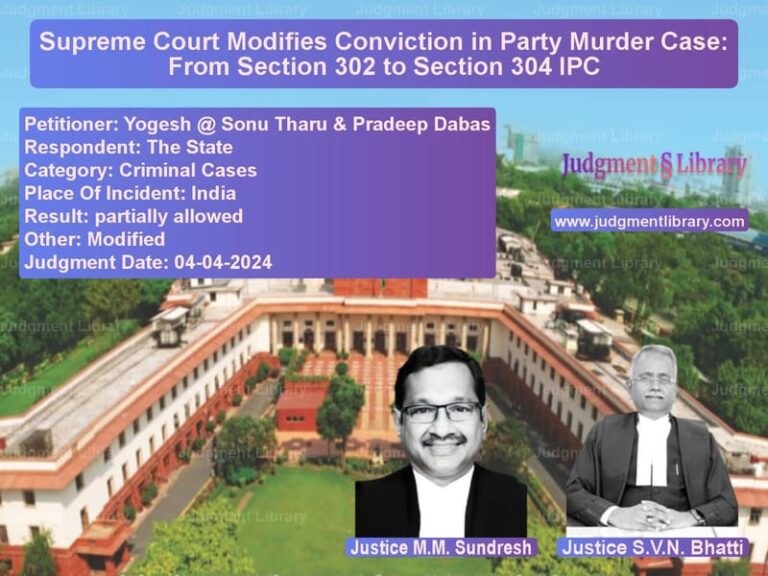Supreme Court Overturns 11-Year Delay Condonation in Land Dispute Case
In a landmark judgment that has significant implications for how courts handle delayed legal filings, the Supreme Court of India has delivered a powerful message about the importance of adhering to limitation periods. The case involved an astonishing delay of 3966 days – nearly 11 years – in filing a second appeal by the Karnataka Housing Board, which the High Court had surprisingly condoned. The Supreme Court’s decision to overturn this condonation reveals deep concerns about institutional accountability and the fundamental principles underlying limitation laws.
The dispute has a long and complex history dating back to 1971, centered around a parcel of land originally owned by the father of the appellant, Shivamma. After her father’s death, disputes arose among legal heirs, leading to various legal proceedings. The crucial turning point came when the First Appellate Court, in 2006, decreed the suit in favor of Shivamma, granting declaration of title but directing compensation instead of possession since the Karnataka Housing Board had already undertaken substantial construction on the land.
The Core Legal Battle Over Delay
What followed the 2006 judgment was remarkable in its negligence. The Karnataka Housing Board took no action for years, only filing a second appeal in 2017 – nearly 11 years after the limitation period had expired. When the High Court condoned this massive delay, Shivamma’s legal representatives approached the Supreme Court, leading to this crucial judgment that reexamines the very foundations of limitation law.
The appellant’s counsel, Mr. Akshat Shirvastava, argued vehemently against the condonation, stating: “That it is most respectfully submitted that the respondent no. 1 failed to demonstrate any sufficient cause and there is no explanation as to why the regular second appeal could not have been filed by the respondent no. 1 within the prescribed period of limitation.” He further pointed out that “from the perusal of the application filed by the respondent no. 1, the last entry in the file of Karnataka Housing Board dates back to 20.03.2008 and that there is no subsequent entry with regard to the movement of files.”
On the other side, the respondents, represented by Senior Counsel Ms. Kiran Suri, argued that “when substantial justice and technical considerations are pitted against each other, the former would prevail specially when public interest is involved.” She contended that “the Government cannot carry on business upon principle of distrust and men in responsible position are to be trusted. The deliberate inaction on the part of the officials and mala fide of the officers, cannot be imputed to the government or Government undertakings.”
Reinterpreting ‘Within Such Period’ in Limitation Law
The Supreme Court embarked on a detailed examination of Section 5 of the Limitation Act, which allows courts to admit appeals filed after the prescribed period if the appellant shows “sufficient cause” for not filing “within such period.” The Court noted conflicting interpretations in previous judgments about what exactly “within such period” means.
Some earlier decisions had interpreted this phrase to mean that the appellant only needs to explain the delay from the last day of limitation until the actual filing date. However, the Supreme Court in this judgment took a different view, stating: “We have no hesitation in saying that both the expressions, by a necessary implication indicate that the phrase ‘within such period’ signifies that the period covered therein extends to not only the original period within which, the appeal or the application, as the case may be, should have been filed, if not for the delay, but also the period taken in addition to the prescribed period of limitation.”
This interpretation means that parties seeking condonation of delay must explain their inaction throughout the entire period from when the limitation clock started ticking until the actual filing date, not just the period after the limitation expired.
The Court’s Powerful Reasoning on Limitation Principles
The judgment delves deep into the philosophical foundations of limitation law, noting that “The law of limitation is founded on public policy. The object of limitation is to put a quietus on stale and dead disputes. A person ought not to be allowed to agitate his claim after a long delay.”
The Court emphasized the importance of two Latin maxims that form the bedrock of limitation law: “interest reipublicae up sit finis litium and vigilantibus non dormientibus jura subveniunt, which mean; ‘it is in the interest of the State that there be an end to litigation’ and ‘the law assists those who are vigilant, and not those who sleep over their rights’.”
Addressing the State’s argument about bureaucratic delays, the Court made this significant observation: “The law as it presently stands, post the decision of Postmaster General (supra), is unambiguous and clear. Condonation of delay is to remain an exception, not the rule. Governmental litigants, no less than private parties, must demonstrate bona fide, sufficient, and cogent cause for delay. Absent such justification, delay cannot be condoned merely on the ground of the identity of the applicant.”
No Special Treatment for Government Entities
The judgment marks a significant departure from earlier jurisprudence that often showed leniency toward government entities in limitation matters. The Court explicitly stated that “State or any of its instrumentalities cannot be accorded preferential treatment in matters concerning condonation of delay under Section 5 of the Limitation Act.”
This represents a major shift from the earlier approach where courts tended to be more forgiving of government delays due to bureaucratic processes. The Court noted that “Public interest is best served by ensuring efficiency and diligence in governmental functioning, rather than by condoning its lapses as a matter of course.”
The Court’s Scathing Assessment of the Housing Board’s Conduct
In examining the specific facts of the case, the Supreme Court expressed strong disapproval of the Karnataka Housing Board’s conduct. The Board had tried to blame the delay on certain officers, particularly an Executive Engineer, but the Court found this explanation unsatisfactory.
The Court noted with dismay that “To our utter shock and dismay, the High Court accepted the explanation of sufficient offered by the respondent no. 1. We are at our wits ‘end’ to understand the aforesaid findings recorded by the High Court.”
The judgment further observed that “It appears that the respondent no. 1 has tried to make the Executive Engineer a scapegoat, who undoubtedly acted in a most irresponsible and callous manner but did not have to take the entire blame to himself.” The Court pointed out that disciplinary proceedings against the concerned officer were initiated only after the condonation application was filed, suggesting this was done merely to demonstrate vigilance before the Court.
Final Ruling and Broader Implications
In its concluding remarks, the Supreme Court made this powerful statement: “It hardly matters whether a litigant is a private party or a State when it comes to condoning the gross delay of more than 11-years. If the litigant chooses to approach the court long after the lapse of the time prescribed under the relevant provisions of the law, then he cannot turn around and say that no prejudice would be caused to either side by the delay being condoned.”
The Court allowed the appeal, setting aside the High Court’s order condoning the delay. This judgment serves as a strong reminder to all litigants, particularly government entities, that the law of limitation must be respected, and condonation of delay remains an exception rather than a rule. The decision reinforces the principle that everyone, including the State, must be diligent in pursuing legal remedies and cannot expect special treatment based on their status alone.
The Supreme Court’s detailed analysis and firm stance in this case will likely have far-reaching consequences for how courts across India handle applications for condonation of delay, particularly those involving government bodies. It signals a shift toward greater accountability and efficiency in the justice delivery system, where procedural rules are given due importance in the interest of finality and certainty in legal disputes.
Petitioner Name: Shivamma (Dead) by LRs.Respondent Name: Karnataka Housing Board & Ors.Judgment By: Justice J.B. Pardiwala.Place Of Incident: Karnataka.Judgment Date: 12-09-2025.Result: allowed.
Don’t miss out on the full details! Download the complete judgment in PDF format below and gain valuable insights instantly!
Download Judgment: shivamma-(dead)-by-l-vs-karnataka-housing-bo-supreme-court-of-india-judgment-dated-12-09-2025.pdf
Directly Download Judgment: Directly download this Judgment
See all petitions in Property Disputes
See all petitions in Damages and Compensation
See all petitions in Contract Disputes
See all petitions in Consumer Rights
See all petitions in Legal Malpractice
See all petitions in Judgment by J.B. Pardiwala
See all petitions in allowed
See all petitions in supreme court of India judgments September 2025
See all petitions in 2025 judgments
See all posts in Civil Cases Category
See all allowed petitions in Civil Cases Category
See all Dismissed petitions in Civil Cases Category
See all partially allowed petitions in Civil Cases Category







